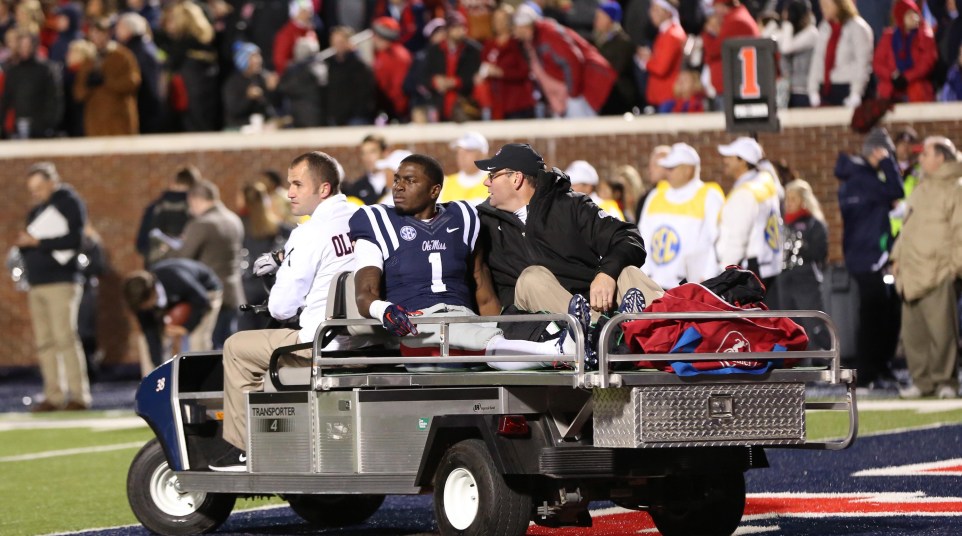Three SEC teams impacted most by critical injuries in 2014
Injuries are unpredictable, but they’re also inevitable in a contact sport like football.
Every team suffers injuries during the course of a season, but how severe those injuries are and how impactful the injured players are can vary. Some teams might escape a season with a few minor injuries; others might have their season derailed by a series of serious injuries to key starters.
We chose to look at the latter of those two scenarios and asked “What if?” about three SEC teams whose 2014 seasons took a turn for the worse due to devastating injuries.
AUBURN
Key injuries: Carl Lawson, Sammie Coates, D’haquille Williams
Impact: The Tigers 2014 season took a turn for the worse months before it even began when star defensive lineman Carl Lawson suffered an ACL tear in his left knee at the end of spring practice in April. Lawson subsequently missed the entire season, and Auburn was never able to make up for his impact as a pass-rusher in the trenches. The Tigers recorded the third-fewest sacks in the SEC and allowed the second-most yards per game through the air as a result.
On the offensive side of the ball, nagging injuries suffered by star wideouts Sammie Coates and D’haquille Williams limited the explosiveness of Auburn’s passing game out of Gus Malzahn’s spread attack. The Tigers don’t like to throw the ball 40 times per game, but just like with their rushing attack they like to play fast and take shots in the passing game. The injuries to Coates and Williams hurt their efforts to do so, and even though the two stars combined to miss just three games they played at less than 100 percent in a handful of others.
Injuries alone are not the reason Auburn lost four games during the regular season, but they certainly didn’t help over the course of the long, grueling season. Had the Tigers had a better pass rush and a full complement of explosive playmakers on offense, it might have had a better chance to make a run at a second straight conference title.
GEORGIA
Key injuries: Todd Gurley, Malcolm Mitchell, Justin Scott-Wesley
Impact: The Bulldogs were held back by injuries to their offense all season, especially at the wide receiver position. Malcolm Mitchell missed Georgia’s first four games after undergoing arthroscopic knee surgery in August, and during his absence the Dawgs threw for just 162 yards per game. In that time they lost to a South Carolina team that closed the year 6-6, and they narrowly escaped past a Tennessee team that also closed the year at an even 6-6. The offense lacked explosiveness without Mitchell on the outside, and the team lacked explosiveness against a slew of modest opponents.
The absence of fellow wideout Justin Scott-Wesley for seven games this season even further hindered the Georgia offense. Scott-Wesley was expected to stretch the field for the Bulldogs, using his speed to create big plays in the passing game. Instead he caught just two passes for 33 yards, and Georgia regressed into a run-heavy, ball-control offense that opponents found easy to keep up with on the scoreboard.
So when star tailback and Heisman contender Todd Gurley was suspended earlier this season, it appeared all hope was lost for the Bulldogs. That’s not true, of course, as Nick Chubb stepped in and ran for 100 yards in every game Gurley was sidelined. When TG3 returned to team up with Chubb in the Georgia backfield, he lasted less than one game before tearing his ACL to end his college career. The rushing attack carried the offense this season, yet it was never able to show its potential at full strength.
Georgia cost itself this season with a lack of discipline and untimely mental errors, but the lack of explosiveness on offense due to injuries may have kept this team from playing for an SEC title at season’s end.
OLE MISS
Key injuries: Laquon Treadwell, Bo Wallace, Laremy Tunsil, Tee Shepard
Impact: By now, most fans are familiar with the devastating leg injury suffered by Laquon Treadwell in Ole Miss’ gut-wrenching defeat against Auburn last month. The injury not only cost Ole Miss that game, but Treadwell’s absence also cost a struggling offense in a 30-0 shutout loss to Arkansas just a few weeks later. Without Treadwell, the Rebels had no game-changing wideouts capable of making big plays down the field, and without a dynamic playmaker the offense regressed tremendously.
However, the story of Ole Miss’ season is impacted by far more than just one leg injury. Star JUCO transfer Tee Shepard was expected to be an impactful nickel corner on the Rebels defense, but a torn tendon in his toe cost him the season before it even began. That lack of depth in the secondary may not have single-handedly cost Ole Miss any games, but it certainly could have improved the nation’s top scoring defense even more — a scary thought indeed.
And although neither played missed any games, quarterback Bo Wallace and All-SEC offensive tackle Laremy Tunsil both played through injuries in the second half of the season as Ole Miss lost three of its final five games. Wallace played on a bum ankle in a loss to Arkansas, and his lack of effectiveness against the Razorbacks was among the biggest reasons the Rebels failed to score that day.
Tunsil also played with a hurt shoulder down the stretch, limiting the best lineman on an otherwise mediocre offensive line.
Had Ole Miss stayed healthy on offense, it might not have had to rely as heavily on its defense in 2014. It’s difficult to project, but a healthy offense to match the Landshark defense might have been the difference between a nice 9-3 season and a historic 11-1 run.
When framed in that context, it’s easy to argue no team was hindered more by injuries in 2014 than the Ole Miss Rebels.

